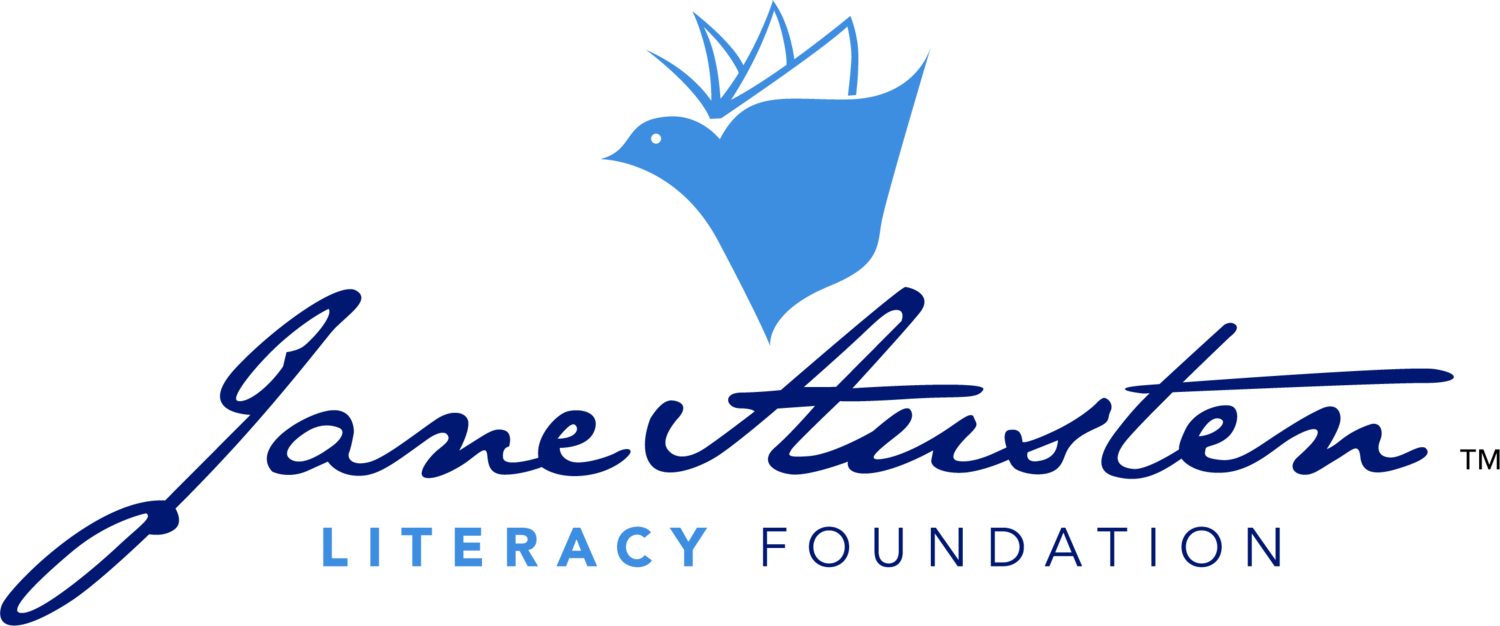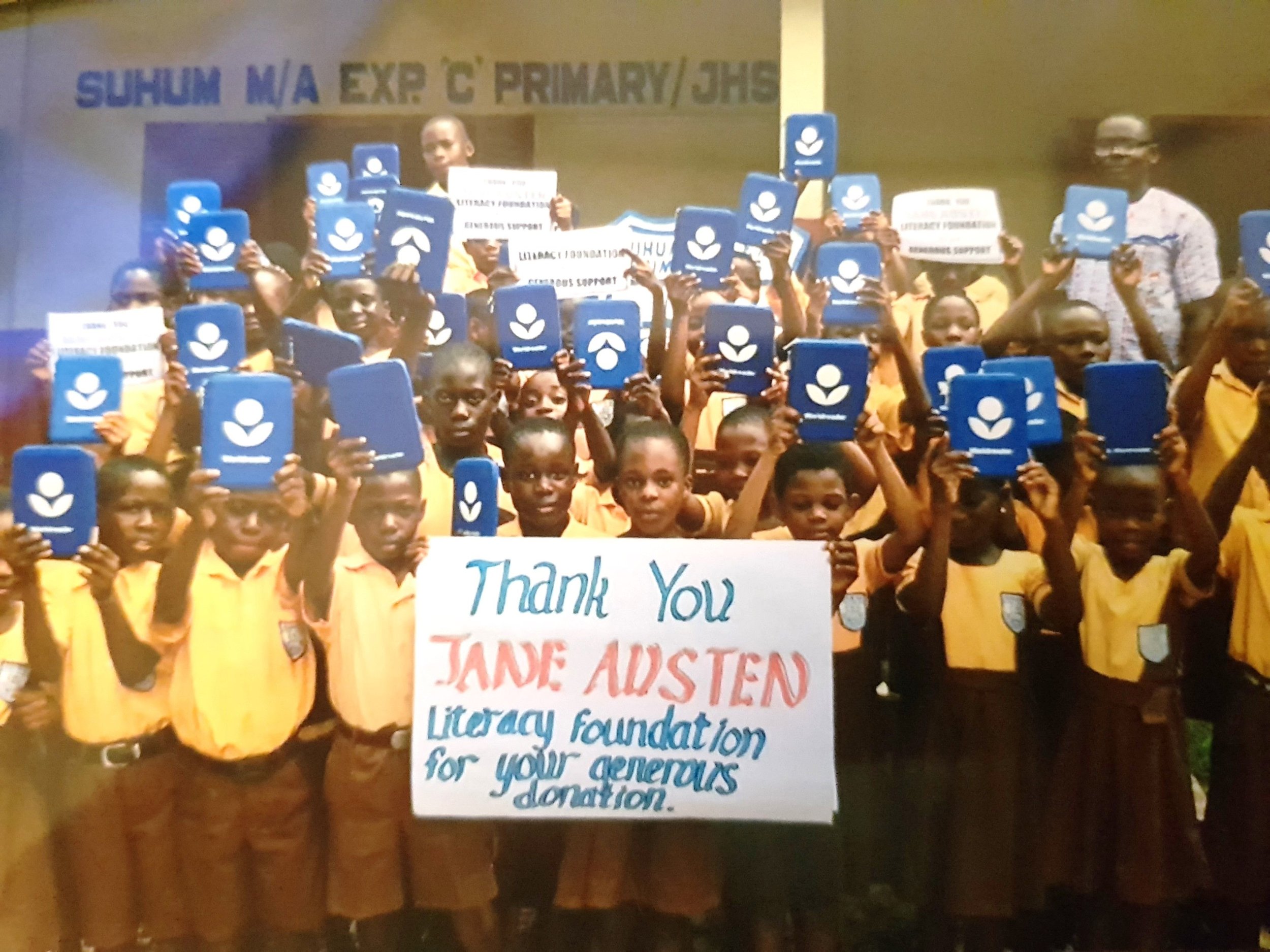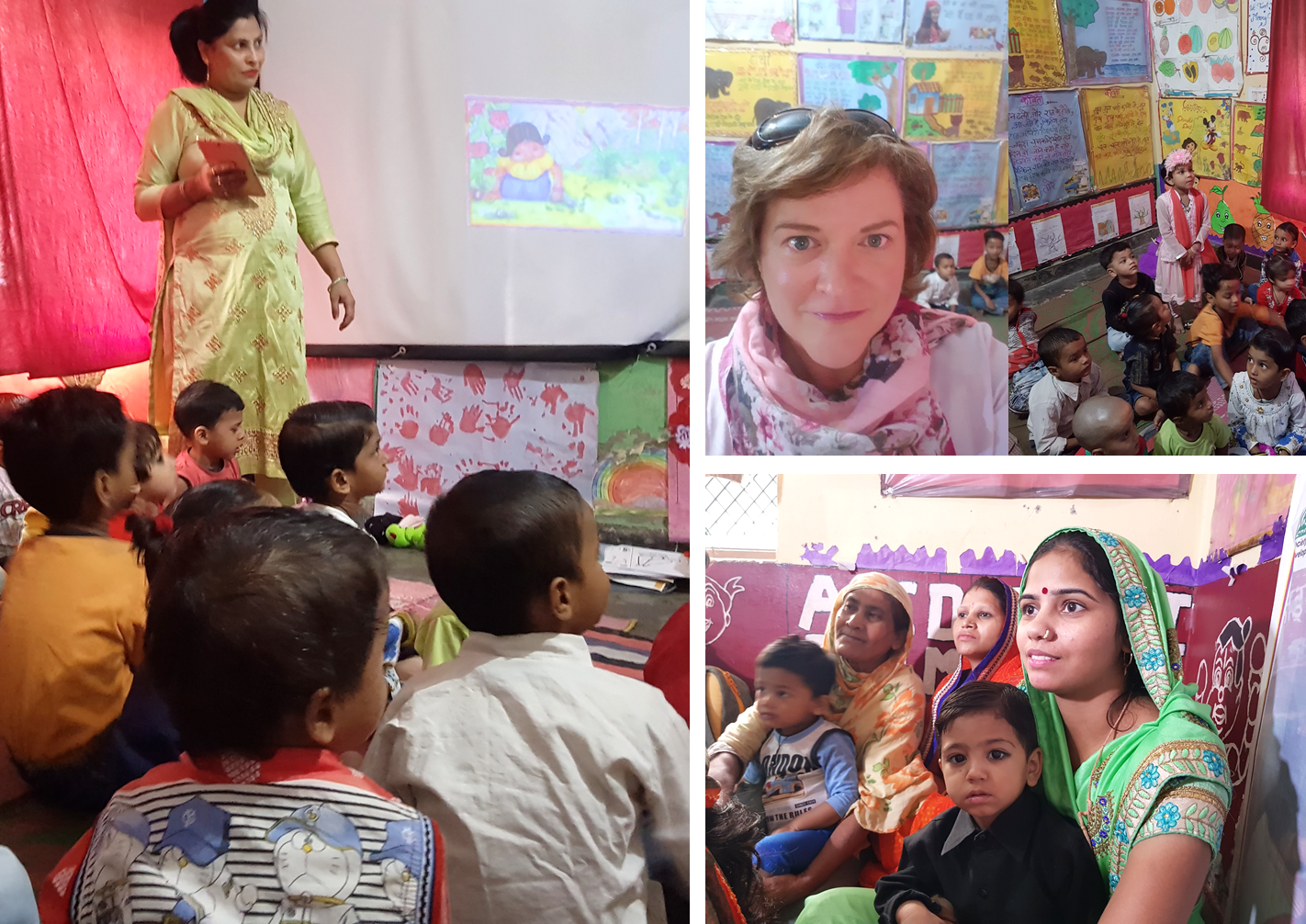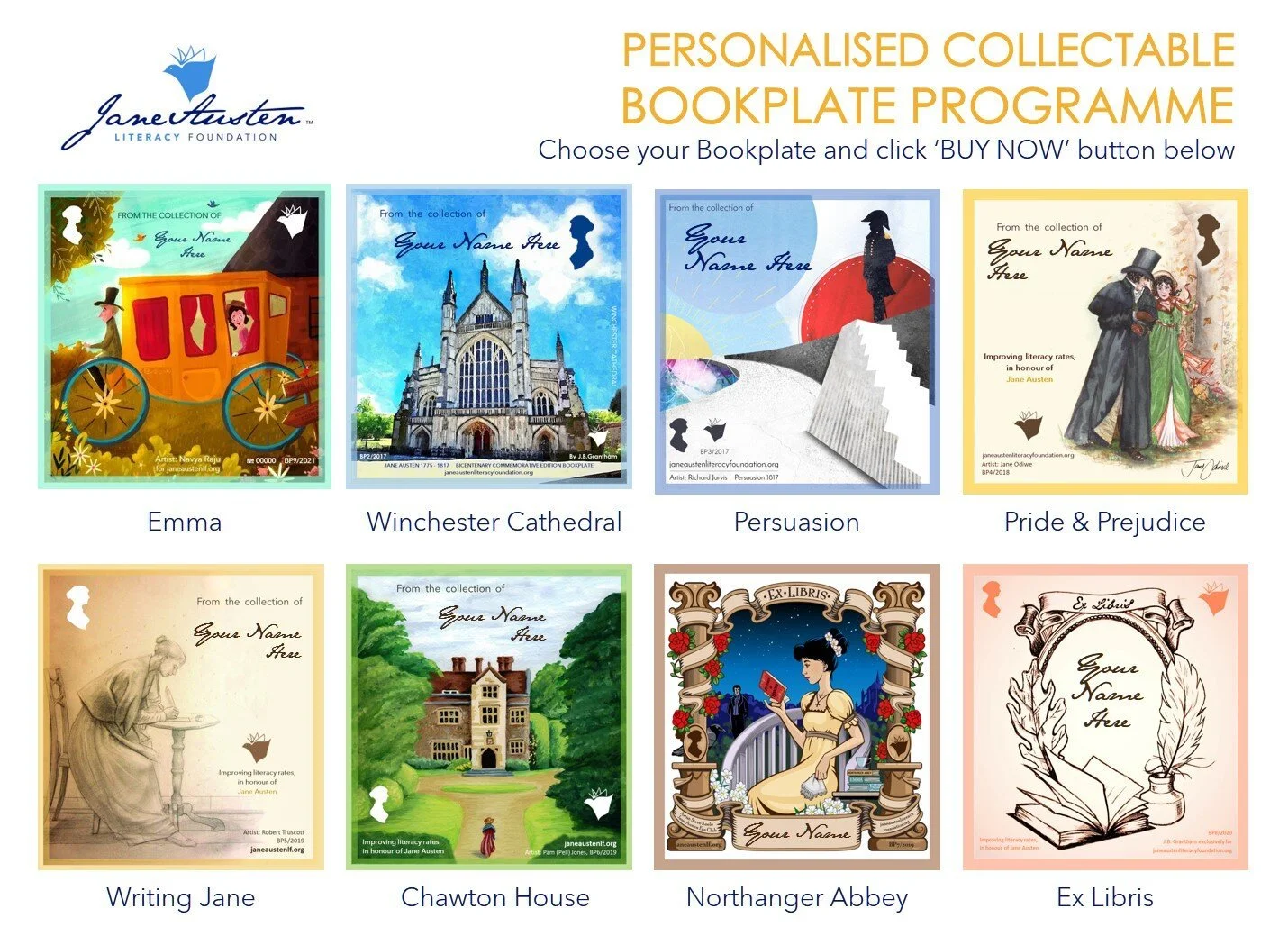AS WE FUND OUR FIFTH DAYCARE CENTRE IN INDIA TO PARTICIPATE IN THE WORLDREADER ‘READ TO KIDS’ PROGRAM, FROM THE PROCEEDS OF OUR JANE AUSTEN TEA FOR LITERACY EVENTS, OUR FOUNDER AND CHAIR SHARES HER TRIP TO DELHI TO SEE THIS WORK IN ACTION
I arrived in Delhi in October 2019 eager to see the literacy projects supported by the Jane Austen Literacy Foundation. We had been raising money for five years, and in that time had funded many projects, including literacy kits for schools in Syria with UNICEF, literacy support for remote Indigenous children in Australia (books, e-readers, e-library, literacy programs) with the Indigenous Reading Project, and a ‘Blue Box’ for a school in Ghana (a complete literacy program including e-readers, e-library, teacher training, technical, and literacy support) with Worldreader, but this was my first trip to see the work for myself.
Suwan School Ghana: image credit Worldreader
In 2019, we had been fundraising to support the expansion of the Worldreader Read to Kids program into more Anganwadi Centres in some of the impoverished areas in Delhi. I was excited to go to India and meet Pradeep Kumar, Associate Director of India Programs and Partnerships for Worldreader, and Bhanu Potta, Global Executive Product Leader and India Board Director. I wanted to learn and be able to talk to our donors and supporters first-hand about the program and the difference we can make.
India has the largest population of illiterate adults in the world with 287 million, 37% of the global total. Despite government programmes, the National Statistical Commission surveyed literacy to be 77.7% in 2017–18. Only 50% of grade 5 children can read a grade 2 level text with comprehension and only 9.4% households have any supplementary reading materials for children. Literacy rates desperately need to improve and yet the last census (in 2011), indicated a 2001–2011 literacy growth of 9.2%, which is slower than the growth seen during the previous decade. Literacy in India is a key for social-economic progress. For children living in poverty, literacy is the path to opportunity and a better life.
After a 15-hour flight, I enjoyed a good night’s sleep in a very comfortable hotel before we set off for our first school visits, to junior schools. It was a few days before Diwali and there was excitement in the air as we drove through the crowded Delhi streets. I didn’t know what to expect. I was intoxicated by the bright colours, stunning architecture, and bustle of the city, but I could also see families living on the sides of the busy roads and men pushing old bicycles piled high with scrap bits of wood or metal, trying to gather enough to sell. Children banged on the car windows when we stopped at traffic lights.
We arrived at the first school to be greeted by children dressed in the most colourful clothes or wearing a school uniform, provided free to each child by the Indian government. We were adorned with bindis and given Diwali cards handmade by the children. It was such a joyous welcome!
Arriving at School - © Jane Austen Literacy Foundation
We watched the children perform plays they had prepared, telling traditional stories—it was impossible not to fall in love with every child. The schools were bright, safe, and full of hope, and it was wonderful to see these children keen to learn and all speaking at the top of their voices as they enthusiastically read aloud together.
We observed teaching in the classroom and spoke to the head teachers about their communities, the needs of the children, and how Worldreader had supported literacy in these schools. It was inspiring and I left full of hope; these children had an opportunity, like all children should have.
Classroom and teachers - © Jane Austen Literacy Foundation
The next day we visited an Anganwadi centre, a pre-school childcare centre. There are 13,000 Anganwadi centres in Delhi alone, each for about 30 children.
The streets got narrower as we neared the centre. We stepped carefully around the snake charmer and down another narrow street, before reaching the door. I was surprised when we got there; it didn’t look like a childcare centre from the outside.
On the way to Anganwadi - © Jane Austen Literacy Foundation
Inside were three small rooms, beautifully decorated with handmade posters about the environment, food groups, and the importance of washing hands to make a colourful and stimulating learning environment. There was a projector, tablet and access to a large library of age and language appropriate books and materials. There were hand puppets for the teacher and children to act out the stories they were reading and printed worksheets for the children to colour in, all provided by Worldreader, who also trained the teacher and regularly visited the centre.
In the Anganwadi -© Jane Austen Literacy Foundation
The teacher used the tablet and projector to share a story and ask the children questions, which they answered enthusiastically. It was a joy to watch the children engaged in the lesson and confidently standing up to speak. After class, I spoke to some of the children’s mothers, with Pradeep acting as an interpreter, and was touched by the passion these mothers have for their children to be educated, to give them a way out of poverty and the chance of a better life. I heard that for some of these parents, it was their ambition that their children be educated well enough to be able to work inside. After visiting the Anganwadi, I was shown where these children lived, in single room dwellings for each family, with no running water and another dwelling and family above. Having experienced such joy in the classroom, it was hard to imagine these children coming home to such crowded and rudimentary homes.
Homes - © Jane Austen Literacy Foundation
The Read to Kids India program is proven to be a, scalable, cost-efficient methodology for supporting early-children literacy development and school readiness in India’s poorest communities. We are convinced that Read to Kids India will prove invaluable in helping its recipient children and families break out of the cycle of poverty, once and for all.
In a programme trial in 2018/19, Read to Kids resources produced the following tangible outcomes:
· Increased teacher confidence
· Increased quality teaching-learning interactions on a daily basis
· Increased student engagement and participation
· Increased vocabulary development
· Reduced student absenteeism
· Increased enrollment as word of positive outcomes spread, especially amongst mothers, leading to
· Enhanced community outreach with parents and caregivers, who also benefited from a better understanding of the importance of storytelling and reading at home
Thrilled with the results of the Read to Kids pilot program, India’s Department of Woman and Child Development requested the Read to Kids India program be expanded into the most impoverished and underserved Anganwadi in Delhi State.
The following day I attended the USAID conference ‘Children’s Literature: A Need, 2019’. I spoke about leveraging corporate partnerships to assist with the distribution of books into rural and remote areas and listened to some fascinating talks about the work being done to produce quality age and language appropriate books for the region.
It was a life changing experience, and I left India more determined than ever to help these children. The recent Jane Austen Tea for Literacy events hosted by volunteers around the world have raised enough money to expand the Read to Kids programs into another Anganwadi centre, the fifth funded by the Jane Austen Literacy Foundation.
I sincerely thank all of our donors, supporters, and volunteers. The Foundation is run entirely by volunteers, and 100% of the donations we receive are spent on literacy programs and activities (I paid for my own flight to India!). We should all feel immensely proud of the work we do.
To help us raise funds to expand the Worldreader Read to Kids program into another Anganwadi centre, changing the lives of more than 35 children and families, please make a donation here (All donations over $2 are tax deductable in Australia):
For US and UK donors wishing to make a tax efficient donation, please donate direct to Worldreader including Jane Austen LF in the message:
When travel and practicalities allow, I look forward to returning to India and sharing more of the literacy work made possible by the Jane Austen Literacy Foundation.
© Caroline Jane Knight - Founder & Chair, Jane Austen Literacy Foundation
References: UNESCO: http://uis.unesco.org/en/country/in
National Statistical Commission: http://mospi.nic.in
CHRISTMAS GIFTS - PERSONALISED BOOKPLATES
Personalised Bookplates are the perfect Christmas present for book loving friends and family. Select a bookplate from our exclusive collection, enter the name you would like on the bookplate and it will be emailed to you, ready to forward as a gift, within 3 days.
Designed by artists, exclusively for the Jane Austen Literacy Foundation, our bookplates are produced and sent as digital images to be printed, cut and paste into favourite books, or printed as a poster, whatever you prefer.











